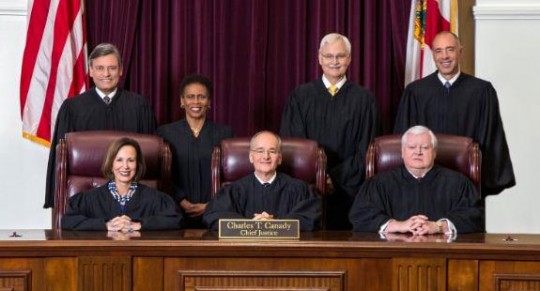Supreme Court Gives Go Ahead To Judicial Appointment
November 27, 2018
With one dissenting justice calling the situation a “travesty,” the state Supreme Court on Monday tossed out a challenge to Gov. Rick Scott’s authority to appoint a replacement for a retiring Northeast Florida circuit judge.
The Supreme Court, in a 4-3 decision, said it would not rule on the case — effectively keeping in place a lower-court ruling that backed Scott’s authority. The Supreme Court indicated in August that it would rule in the case and heard oral arguments in October.
But in a one-page order Monday, the majority said it was dismissing the case and that the earlier decision to hear it had been “improvidently granted.” The majority was made up of Chief Justice Charles Canady and justices Ricky Polston, Jorge Labarga and Alan Lawson.
The case centered on whether Scott — or voters — should pick a replacement for 4th Judicial Circuit Judge Robert Foster, who was originally slated to leave office Jan. 7, 2019, which would have been the end of his term because of a mandatory retirement age. But on April 2, Foster sent a letter to Scott making the resignation effective Dec. 31, four business days ahead of schedule.
The Scott administration argued that the governor’s acceptance of a judicial resignation before the start of an election-qualifying period created a vacancy that should be filled by appointment, rather than election. If Foster retired on Jan. 7, the post would be filled by election.
Jacksonville attorney David Trotti, who wanted to run for the seat, filed a lawsuit challenging Scott’s authority to appoint a replacement for Foster. The 1st District Court of Appeal sided with Scott, leading Trotti to take the dispute to the Supreme Court.
The decision Monday to reverse course and not decide the case drew a scathing opinion from Justice R. Fred Lewis, who said Foster and other judges in the past have manipulated the process to ensure the appointment of successors. Lewis started his 10-page dissent by giving a dictionary definition of the word “travesty.”
“This accurately describes the circumstances in this case, which allow judges to make a mockery of our Florida Constitution with impunity. The issue is whether a judge can prospectively resign during an election year to manufacture a vacancy that will be filled by gubernatorial appointment instead of a regularly scheduled election,” Lewis wrote. “Rather than addressing this direct affront to our constitutional system of checks and balances, the (Supreme) Court neglects its duty and turns a blind eye to this sham.”
Lewis wrote that nothing in state law or the Florida Constitution gives trial judges the right to delay their resignations for eight months. He added that if “judges would like to resign early, then they should actually resign and leave office. By allowing these judges to remain on the bench, the (Supreme) Court effectively allows its own qualifying period cutoff to be rendered nugatory — subject to the whims of individual judges in election years.”
Justice Peggy Quince, in a dissent joined by Justice Barbara Pariente, argued that, under the circumstances, Foster’s vacancy should be filled by election. She wrote that the “gamesmanship on display here could serve to undermine the voters’ respect for the courts.”
“Surely when the people determined that they would prefer to elect certain judges, they did not intend for that desire to be circumvented by artificial vacancies,” Quince wrote.
But during oral arguments in October, Daniel Nordby, general counsel for Scott, called it “long-settled law” that a judicial vacancy occurs at the time a resignation letter is submitted to the governor and accepted — not at the time the judge leaves office.
by Jim Saunders, The News Service of Florida
Comments
4 Responses to “Supreme Court Gives Go Ahead To Judicial Appointment”




Not surprising is, that both Justices Peggy Quince and Barbara Pariente are democrats appointees who were both appointed to the court in a December appointment. I guess “electing” a judge in the following year wasnt as important then as it seems to be today.
It is noted that the Quince appointment was made by Democrat Lawton Chiles and confirmed by Republican Jeb Bush in order to avoid potential future controversy over her appointment.
It never gets old listening to the whine of Democrats who oppose actions they themselves have used in the past. This should have been a non-issue for either of these two dissenters.
Very true in all aspects of life. The sad part is that it should not matter what political affiliation any judge has – they are supposed to uphold our existing laws regardless of their personal convictions.
Not surprising is, both Justices Peggy Quince and Barbara Pariente – both democrats appointees – were both appointed to their positions in a December appointment. I guess “electing” a judge in the following year wasnt as important then as it seems to be today.
It is noted that the Quince appointment was made by Democrat Lawton Chiles and confirmed by Republican Jeb Bush in order to avoid potential future controversy over her appointment.
It never gets old listening to the whine of Democrats who oppose actions they themselves have used in the past. This should have been a non-issue for either of these two dissenters.
This just proves that there is always more than one way to skin a cat.